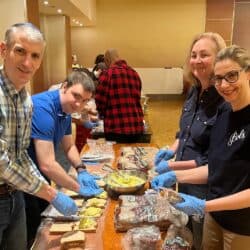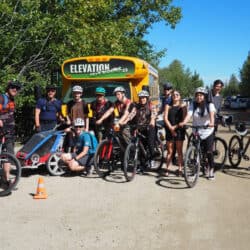There’s wide agreement that Canada’s volunteering ecosystem needs a reset to meet today’s demands by non-profit organizations and the shifting Canadian population.
Amid growing need among organizations for donations of time and talent, there are markedly fewer volunteers who fit the mould of past decades: people with deep community roots and motivation to “give back” and having the financial security and time to make long-term sustained commitments to roles in community organizations. Furthermore, expectations of diversity and inclusion mean that volunteer agencies must newly consider who they’re attracting as potential volunteers and what sort of work for whose benefit gets counted in this sphere.
These problems are connected to demographic changes, new patterns of work, and new expectations of what volunteering is for. As Joanne McKiernan of Volunteer Toronto recently put it, “Volunteer shortages are the reported symptom, but the diagnosis of the problem goes much deeper in what activities we rely on paid or unpaid labour for [and] who we design those roles for.”
Newcomers are told . . . that volunteering is a way to acculturate and gain experience and references, paving the way for employment.
Newcomers are told by Canada’s governments that volunteering is a way to acculturate and gain experience and references, paving the way for employment. The numbers bear it out: of Volunteer Ottawa’s registered volunteers who choose to self-identify, 30% have immigrated to Canada within the past eight years. In responding to this growing interest in volunteerism by newcomers, charities must become more welcoming by learning to work across cultural and linguistic differences; to involve diverse staff members in recruitment, training, and mentoring; and to consider helpful accommodations related to food, scheduling, and reimbursement of expenses.
Once newcomers have transitioned into employment or full-time family caregiving responsibilities, they become less able to spend their time on volunteering, or may hold casual part-time jobs that are incompatible with a regularly scheduled commitment. This is a fully reasonable path for newcomers who are encouraged to use volunteering as a step in their settlement. For non-profits, however, the upshot is an ever-smaller group of volunteers who offset recruitment and training efforts with a long-term scheduled commitment to their organizations.
Screening requirements become an obstacle to recruitment – and may be unnecessary for low-risk volunteer roles.
Another element of current organizational practice at odds with both inclusiveness to volunteers and volunteer supply for non-profits is the extensive screening often required for volunteering eligibility. The requirement to submit personal information for police background checks presumes a relatively privileged level of comfort with law enforcement, which newcomers and racialized applicants may find unwelcome. As well, recent newcomers may lack enough in-Canada history for such checks. For organizations, such screening requirements become an obstacle to recruitment – and may be unnecessary for low-risk volunteer roles.
These are just some of the ways in which the non-profit sector must grapple with the ways in which “old-school” volunteerism remains a practice of privilege, and with the new pool of volunteers less able to fill the sector’s needs. To undo this privileged lens, some are urging that the non-profit sector view volunteering more inclusively as extending to care work and informal aid in one’s existing social circles, rather than just formal regularized practice.
At the national level, work is underway to address this need for new approaches, including the National Volunteer Action Strategy under development by Volunteer Canada. It may consider ways to make volunteering more accessible and inclusive to newcomers as well as racialized and low-income Canadians. It may also consider how social funders could build in greater financial supports to volunteer programs, and how organizations might reduce over-screening of applicants.
What can be done right now to signal a recognition of the need to make volunteering more inclusive in what and who it recognizes as falling under its umbrella?
In the meantime, volunteer centres across Canada need to carry out their mandate to match volunteers with organizations needing them, and to keep the “old model” of volunteering afloat while a new ship is in the blueprint stage. What can be done right now to signal a recognition of the need to make volunteering more inclusive in what and who it recognizes as falling under its umbrella?
In the nation’s capital, Volunteer Ottawa is making efforts in several areas, such as partnering with local non-profit Refugee 613 to create infographics about volunteering for newcomers, available in 16 languages. Perhaps the most high-profile advancement of inclusiveness is the expanding recognition in recent years of whose excellence in volunteering, and for which organizations, merits recognition through our annual VOscars Lifetime Achievement Award. In 2023, Volunteer Ottawa (VO) honoured Sarah Onyango, an outstanding community builder and media personality recognized for her extensive volunteer work and leadership, especially in Ottawa’s African and Caribbean communities. For the 2024 Lifetime Achievement Award, we are honouring Bharat Rudra this fall for his decades of contribution to entrepreneurship among Ottawa communities with roots in the Indus region and for his support for Indo-Canadian charitable ventures and culture. Both of these honourees represent a deliberately expanded recognition by VO of volunteering beyond the “establishment” civic institutions and charities supported by previous years’ honourees.
This more expansive recognition of community-focused volunteering must be done well to be truly inclusive in its impacts. From communications and event planning to networking and follow-up engagement, VO aims to ensure that our choice of honourees helps our members, stakeholders, and funders to understand the importance of inclusive volunteering to a stronger civic and social fabric across Ottawa as a whole.
The changes needed are above all systemic and cross-sectoral in nature. Significant steps forward will likely come once Volunteer Canada develops its National Volunteer Action Strategy to address big-picture coordination and financing issues spanning non-profit and government sectors. In the meantime, however, local non-profits and volunteer agencies can at least familiarize themselves with the scope of challenges in their own communities, identifying where the gaps in services and recognition lie to make volunteering more inclusive and diverse. They can also ensure that they stay engaged with local developments that may affect or worsen existing conditions. Volunteer Ottawa staff did so, for instance, in successfully advocating to Ottawa’s city council this year against imposing a new fee for “vulnerable sector checks” that would have boosted the police department budget at the cost of increasing already-steep barriers to volunteering by newcomer and lower-income groups.
We look forward to joining with non-profits and volunteer agencies across Canada to discover best ways forward in changing volunteerism for new needs.

